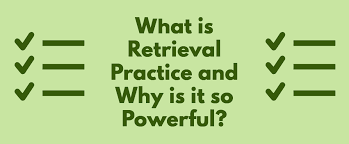Retrieval practice
Teachers always have questions such as: What can we do to reduce students’ forgetting?! How can we use our limited amount of classroom time and make the best of it?
When the learner is having a big exam coming up, and he needs to review the material—what would be the best way for him to study? Well, you might think that you should re-read the textbook or look over your notes, but it turns out that one of the most effective ways to study is by testing yourself on the material. When you're trying to learn, your tendency can be to reread what you're learning or highlight, or underline. But the best way to learn involves an approach called "retrieval practice."
In other words, the mere act of answering questions will strengthen memory—a phenomenon that is called the Testing Effect, or sometimes test-enhanced learning or retrieval practice.
What is Retrieval practice:
Definition: Retrieval practice is a strategy in which bringing information to mind enhances and boosts learning. Deliberately recalling information forces us to pull our knowledge “out” and examine what we know.
When you learn something—anything— you are creating links between neurons in long-term memory. Each time you retrieve these ideas from your own mind, you're strengthening those sets of links. Hundreds of studies have shown that retrieval practice— retrieving the ideas from your own mind—is the best approach to learning. It not only builds memory but also significantly boosts your conceptual understanding.
Struggling to learn – through the act of practicing what you know and recalling information – is much more effective than re-reading, taking notes, or listening to lectures. Slower, effortful retrieval leads to long-term learning. In contrast, fast, easy strategies only lead to short-term learning.
What's the best way to do retrieval practice?
Use flashcards, repeating your practice over a number of days until you can retrieve the ideas, approaches, or techniques easily from your own mind.
There are many ways to practice retrieving information. It can be as simple as the example discussed above – put your course materials aside and simply try to recall information mentally or on a sheet of paper. Other ways to use retrieval practice include:
Use practice tests – make your own practice questions, make and share questions with a study partner, use practice questions provided by the instructor or found in a textbook, or find questions from online sources (for example, Quizlet).
Make flashcards – this commonly involves writing on index cards (questions on one side, answers on the reverse). You can also make flashcards on a computer and print them out or use flashcard software systems.
Use a copy-cover-and-check method – simply cover your lecture slides, attempt to recall, and then uncover to check. Like the method discussed in an earlier section of this page, this method has the advantage of requiring little-to-no added work before you start retrieval practice.
How to Study Less and Remember More [PDF], includes a summary of how to use retrieval practice
Overall, by using retrieval practice, you are increasing the likelihood that you will successfully remember relevant information during your next high-stakes exam.
Why it works:
• Immediate testing promotes better long-term retention than repeated studying, even without feedback from testing.
• Spaced presentation or retrieval leads to better performance on delayed tests.
• Testing, or forced retrieval practice, creates a desirable difficulty during learning that produces elaboration of existing memory traces and their cue-target relationships.
Resources:
https://www.osmosis.org/learn/Testing_effect

